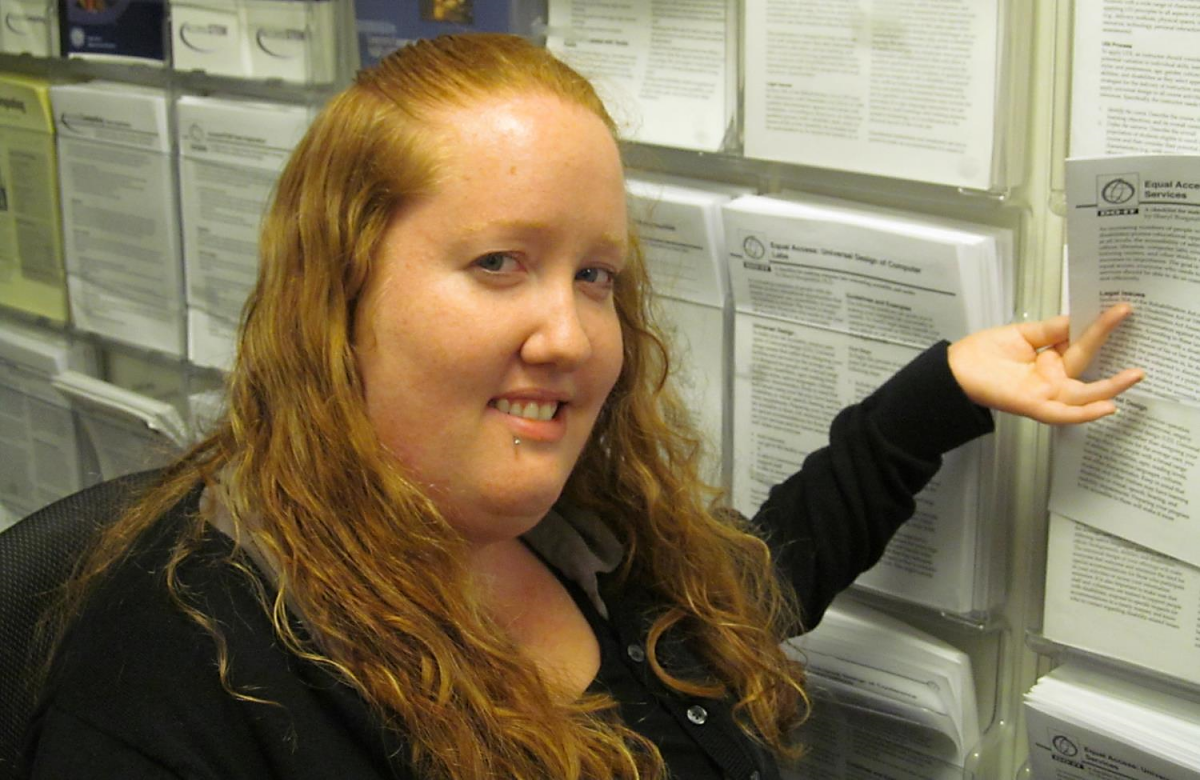 Kayla Brown, 26, is a graduate student in the School of Social Work at the University of Washington (UW). A self-described activist with an interest in social justice, Brown works at DO-IT, a center that supports students who are disabled and interested in STEM (science, technology, education and mathematics).
Kayla Brown, 26, is a graduate student in the School of Social Work at the University of Washington (UW). A self-described activist with an interest in social justice, Brown works at DO-IT, a center that supports students who are disabled and interested in STEM (science, technology, education and mathematics).
DO-IT stands for disabilities, opportunities, internetworking and technology. Staff and leaders from DO-IT work closely with the Center for Sensorimotor Neural Engineering (CSNE).
As part of her job, Brown works one-on-one with people with disabilities. She facilitates mentoring sessions and works with students on transitioning to college and stays in contact throughout the year.
Disability in the classroom, at universities
As an undergraduate majoring in community psychology at the UW, Brown studied up on disability issues. She also started to notice an inequity in education for people with disabilities. When you’re in a classroom and you look around the room, how many classmates look like you? Not many, in Brown’s case, she said. And that’s something that she’d like to help change.
National statistics shed more light on the disparity: 10.8 percent of undergraduate students enrolled in postsecondary education from 2007 to 2008 had a disability, a figure several percentage points lower than in 2003 to 2004.
Brown is personally interested in how people with disabilities are portrayed in the media. “Media representation affects people greatly,” she said. “It’s one of the greatest influences we have right now.”
FIXED documentary, diverse viewpoints resonate
It is no surprise, then, that she watched the documentary,FIXED: The Science/Fiction of Human Enhancement, with great interest. The CSNE hosted the screening and Seattle premiere of the film in October.
The film presented more than a dozen different views on emerging technologies—things like the exoskeleton and brain-computer interfaces—from disability activists, ethicists and scientists.
“It’s a really important film in understanding your own personal opinion versus what’s important to other people,” Brown said. “On a personal level, I am hesitant to talk about modifications to one’s physical body because I’m very comfortable in my body.”
Brown’s take is similar to views expressed in the film by Gregor Wolbring, biochemist at the University of Calgary, and Patty Berne, disability justice educator.
“It goes back to whether we think of disability in the right way when we are thinking about these modifications,” she said. “We have to think about it in the right mindset. Don’t say, ‘These poor people, we have to save them. We have to fix them.’ Instead, say, ‘what can we do to make their lives what they want?’”
Brown said she’s learned through teaching and talking with others about their perception of disability how people view disability. “Students say, ‘They need to go to the doctor a lot, they need to take medicine and they have a wheelchair,’” she said. “It’s all very closed-minded.” Brown is hopeful that with events like the film screening, everyone’s perspective can expand.
Advice for researchers
What advice would she offer for researchers working on new technologies to help people who are disabled? “This screening was a great first step,” she said. “The mainstream disability rights movement’s motto is “Nothing about us without us.” Especially in any kind of scientific setting, it’s really important to always get perspectives from many different people.”
Brown said it’s also important to prioritize. “It’s challenging because researchers are working with time-sensitive funding. Why would you put something on hold to completely change what you’re doing?” It might be easier, for starters, if students who are beginning the process of becoming scientists could take a greater interest in learning about what disability means. “That can change their whole path, their whole direction and what they want to do,” said Brown. “A lot of them want to make change in the world, and what better way to do it than with new technologies?”
At the screening, Brown advised the audience to “talk to people, and go to places that you normally wouldn’t go” to get feedback. Listen to others, she said. “Scientists should learn how to be an ally. It’s a process. Nobody gets it right all the time.”
To wit, Brown said that she is corrected all the time about the language she uses. “It’s really about being comfortable with people correcting you, or challenging you. Because we are challenged every day and other minorities are, too. People who are able-bodied don’t understand that’s something we deal with all the time, so they should feel comfortable with it also, and asking questions. Never assume. What it comes down to is people’s perception of what disability means, and I want them to have a more positive outlook on it.”
